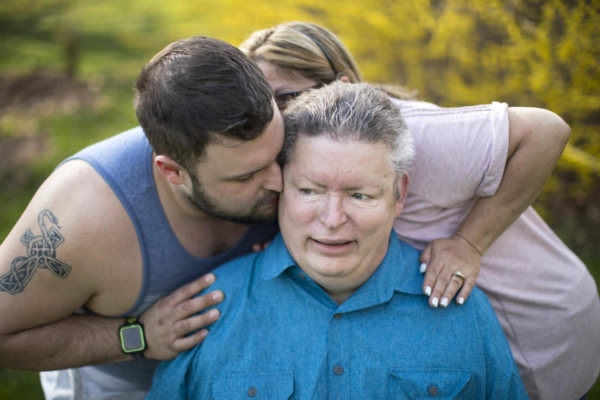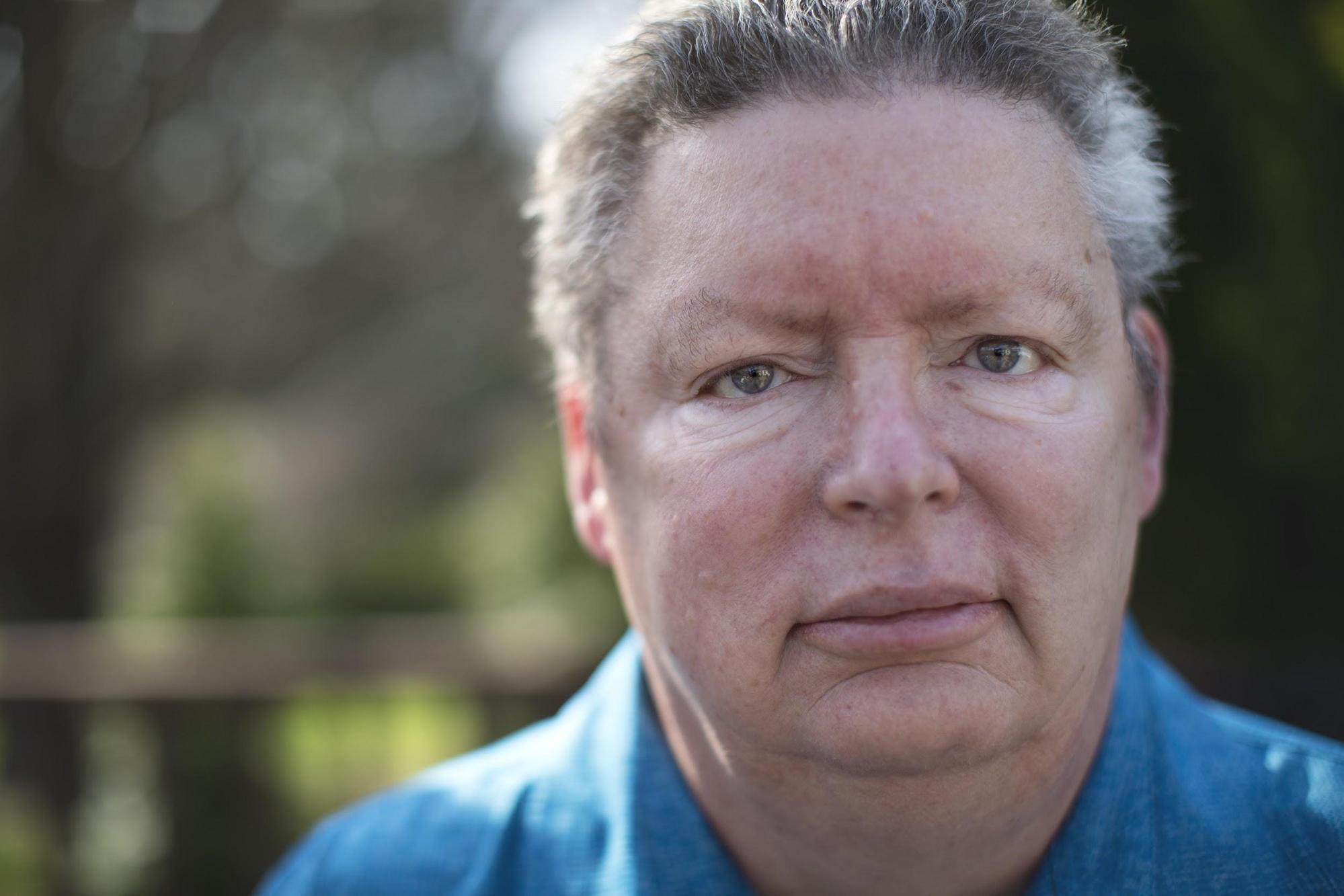
Shawn’s Story
Patient Voices
Shawn
FSHD
Orange, Connecticut | Born February 1959
My smile is crooked. Sometimes when I talk, because I lack minute facial expressions, I come across as condescending and mean. My heart is the part that is open, friendly, and loving, but it takes a while to get to know that.
Shawn kind of hates his minivan. “For me, my car is an expression of who I am,” he says. “I never thought this would be it.” The minivan comes equipped with a rear wheelchair lift. With the push of a button, Shawn can open the rear hatch and slowly lower the lift platform to the driveway below. Sitting in his wheelchair, it takes just another click of the button to raise him gradually and smoothly into the rear of the van. Despite his lack of enthusiasm, maintaining the ability to drive is in itself a worthy accomplishment.
Shawn lives with facioscapulohumeral muscular dystrophy (FSHD), a rare, progressive, and debilitating disease. It is characterized by progressive skeletal muscle loss that results in significant physical limitations, including gradual loss of facial muscles that can cause an inability to smile or communicate. “My smile is crooked. Sometimes when I talk, because I lack minute facial expressions, I come across as condescending and mean. My heart is the part that is open, friendly, and loving, but it takes a while to get to know that.” Maintaining his outward manner has been a constant battle, as FSHD has drastically changed Shawn’s abilities and appearance over the years.
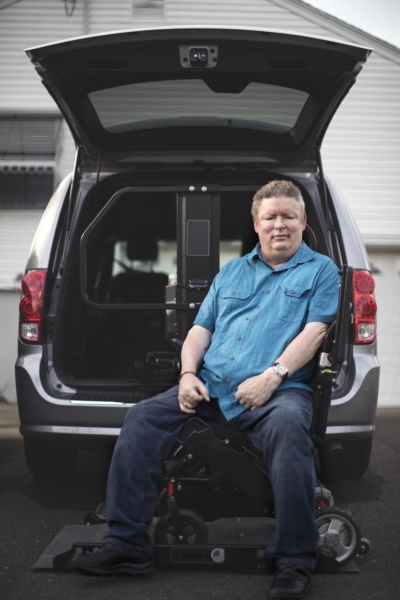 Cars are the love of Shawn’s life. Well, that and his wife and son, Diane and Patrick. With them by his side, or not, nothing supersedes the pure, uninhibited enjoyment he gets from driving. In his favorite cars, he has experienced both freedom and deep camaraderie. “I used to have a white and gold Mustang,” he reminisces. “I had a Monte Carlo SS. That was in my 30s. It had a big block engine. It was strong, bold, very outgoing, and confident. I just loved to drive. I loved to go fast.” He begins to relay more stories of his favorite cars—his Plymouth Satellite, F150, Jeep Wrangler, a pair of conversion vans—he loved them all for different reasons, but none compared to his Mercedes GLK 250 BlueTEC diesel.
Cars are the love of Shawn’s life. Well, that and his wife and son, Diane and Patrick. With them by his side, or not, nothing supersedes the pure, uninhibited enjoyment he gets from driving. In his favorite cars, he has experienced both freedom and deep camaraderie. “I used to have a white and gold Mustang,” he reminisces. “I had a Monte Carlo SS. That was in my 30s. It had a big block engine. It was strong, bold, very outgoing, and confident. I just loved to drive. I loved to go fast.” He begins to relay more stories of his favorite cars—his Plymouth Satellite, F150, Jeep Wrangler, a pair of conversion vans—he loved them all for different reasons, but none compared to his Mercedes GLK 250 BlueTEC diesel.
“It had everything,” he says. “It was one of the best cars ever made.” Shawn bought the car as a retirement gift to himself just a few years ago. It was jet black, beautiful, finely engineered, and worked for Shaun’s accessibility needs, at least for a while. “I finally felt like I made it!”
Sadly, Shawn recently had to give up his GLK. One night while attempting to store his wheelchair in the trunk, he lost balance and pitched backwards. His head smashed on the pavement. Shawn was treated for head wounds, but nothing could cure his heart. It was then he realized he must relinquish his prized possession, and that his days of driving independently were over. “I felt like I was giving up,” he says. Defeated, he sold his GLK and started driving the accessible minivan with assistance from his family.
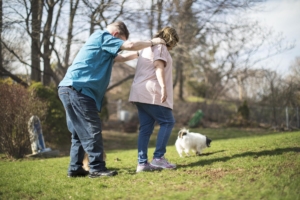 Diane, his wife of over 30 years, has been crucial to providing at-home assistance. Resting his arms on her shoulders for support, Shawn can still walk around his yard in Orange, Connecticut. Diane has stepped up to provide him the care and assistance he needs as the disease progresses. Patrick too, lends a helping hand whenever possible, and takes a turn walking with Shawn to help him get exercise.
Diane, his wife of over 30 years, has been crucial to providing at-home assistance. Resting his arms on her shoulders for support, Shawn can still walk around his yard in Orange, Connecticut. Diane has stepped up to provide him the care and assistance he needs as the disease progresses. Patrick too, lends a helping hand whenever possible, and takes a turn walking with Shawn to help him get exercise.
Shawn has insisted on testing Patrick multiple times for FSHD, as each negative test result does not satisfy his apprehension about handing the genetic illness to his son. “You think three times would be enough,” says Patrick. “But it’s not.” Shawn retorts and they begin to argue. Diane steps in to break it up. “I am the peacekeeper,” she says. Like in many New England households, to quarrel is to love. Underneath the daily frustrations, Patrick is eternally grateful to his father. “He’s taught me a lot,” reflects Patrick. “I’ve learned not to sweat the small stuff anymore.”
Underneath the daily frustrations, Patrick is eternally grateful to his father. “He’s taught me a lot,” reflects Patrick. “I’ve learned not to sweat the small stuff anymore.”
Shawn grew up not far from where he lives today in Connecticut. “I never thought I was going to be disabled,” he reflects. At the age of 18, Shawn started out in the world as a young adult, ready to take on any challenge that was thrown at him. After what he thought was a simple arm injury, Shawn learned that he had FSHD. It was devastating news. “They told me that I was probably going to die from muscular dystrophy at 30 years old—that I would probably roll over and suffocate myself in my sleep.”
“You know how many years it took to get out of that?” Shawn exclaims. “That’s a scary feeling.” Distraught with his diagnosis and battling insomnia, Shawn took off. “I got into a car and I drove all over the United States living from place to place for a few years.” However, no matter where he ended up, he could not escape FSHD—so Shawn lived boldly and drove fast, with the knowledge that he would eventually lose his physical prowess.
However, no matter where he ended up, he could not escape FSHD—so Shawn lived boldly and drove fast, with the knowledge that he would eventually lose his physical prowess.
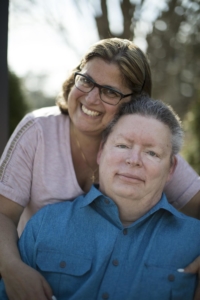 After his odyssey, Shawn eventually returned to Connecticut to be with family. It was then that he met Diane at the car dealership where he worked. He charmed her incessantly, despite the fact that she already had a boyfriend, and the two soon fell in love. They got married and decided to start a family, knowing well that their children might be affected by FSHD. Shawn found work that he could do without too much muscular exertion, working as a dispatcher for the local police department, and then transitioned to a job as a crime analyst, which he did for 20 years until retiring.
After his odyssey, Shawn eventually returned to Connecticut to be with family. It was then that he met Diane at the car dealership where he worked. He charmed her incessantly, despite the fact that she already had a boyfriend, and the two soon fell in love. They got married and decided to start a family, knowing well that their children might be affected by FSHD. Shawn found work that he could do without too much muscular exertion, working as a dispatcher for the local police department, and then transitioned to a job as a crime analyst, which he did for 20 years until retiring.
As Shawn’s mobility continues to decline and his muscle groups no longer function correctly or at all, he maintains a positive attitude. Always a forward thinker, he continues to overcome daily challenges and share his story with the FSHD patient community. “When we’ve come up against something that we didn’t think we could do, we’ve been able to figure out ways around it ourselves, and we like to share that with other people,” he says.
FSHD has forever altered Shawn and his family’s landscape, his goals and aspirations for his autumn years, and yes, the cars he gets to drive. However, he refuses to let the disease define his personality or get him down. “You can dwell on the bad things and what life has given and taken from you, or you can dwell on the good things and feel good,” he says. He aspires to understand himself and those around him better, while helping undo damaging stereotypes of the less-than-fully able population. “I want to love more. I want to be successful. Being successful is having family and friends and being able to call others ‘brother’ or ‘sister.’ I don’t want any kid who is disabled to ever think that they are less than anyone else. I want them to know, when they wake up every day, that their life has meaning.”
